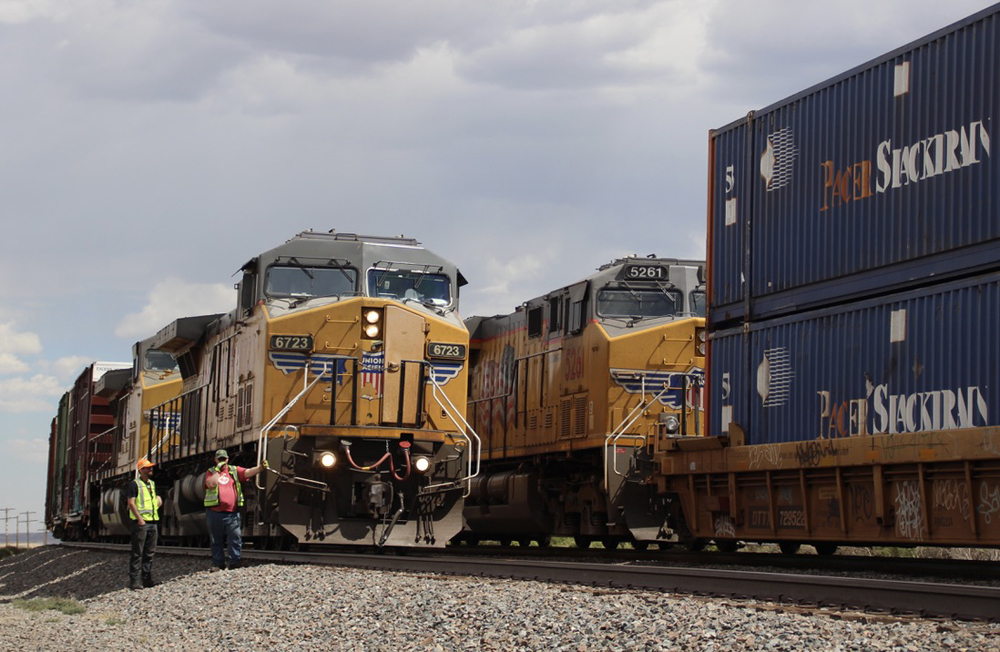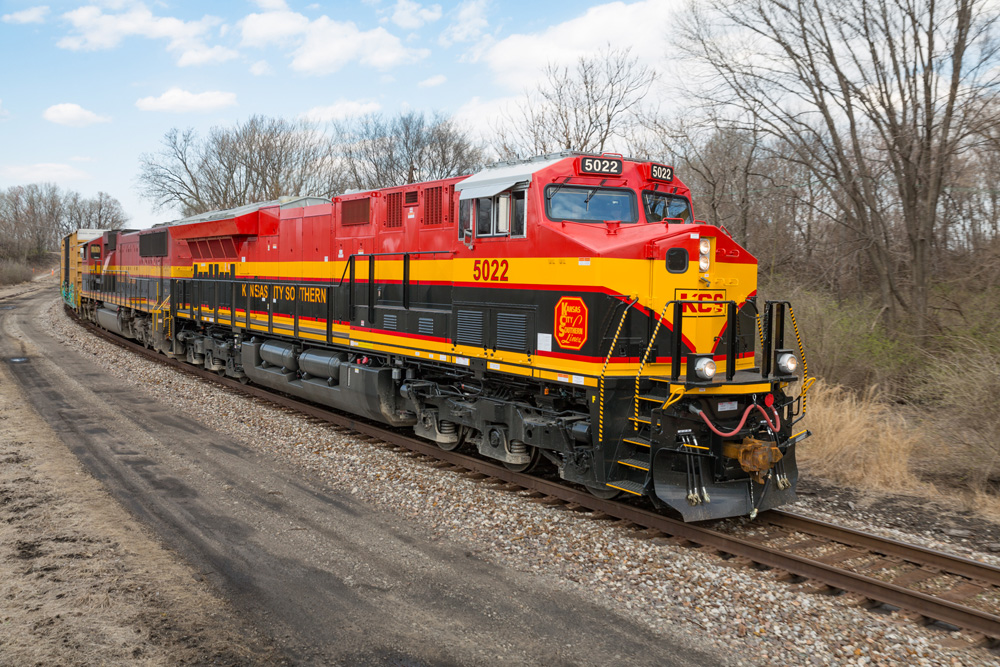
NEW YORK – Investors who have launched shareholder resolutions seeking paid sick time for railroad employees say that the lack of paid sick days endangers workers’ health, threatens the economy, and has made it harder for railroads to retain their unionized employees.
Activist investors today filed the non-binding shareholder resolutions requesting that Union Pacific and Norfolk Southern provide all employees with paid sick time.
Trillium Asset Management, which filed the resolution with Union Pacific, said it was reasonable for railroads to offer paid sick time because railroad employees are essential workers who keep critical commodities moving.
“Focusing on the short term at the expense of workers poses potential risks to the company and the economy,” Kate Monahan, a director at Trillium, said in a statement. “As shareholders, we are asking management to reprioritize and take the longer-term view that safeguarding the health and safety of their workers will better position them for the future.”
The resolution at Norfolk Southern was filed by Impact Shares, a Dallas-based activist investment firm.
“We believe paid sick leave to be essential to protecting and maintaining one of a company’s – and the economy’s – most important assets: workers,” Impact Chief Engagement Officer Marvin Owens said in a statement. “Paid sick leave should not be seen by companies as an expense, but as a prudent investment – an insurance policy that will promote a strong workforce and, by extension, a healthy economy.”
UP and NS shareholders could vote on the resolutions in the spring if the proposals are ultimately included in their annual proxy forms.
Trillium and other investors filed a similar resolution at CVS Health last year. The CVS board of directors recommended that shareholders reject the resolution. The resolution won the support of just 26% of CVS shareholders.
Bascome Majors, an analyst at Susquehanna Financial Group, has estimated that providing all workers with paid sick time would trim railroad earnings by as much as 2%.
Paid sick time became a flashpoint in negotiations between the Class I railroads and the four unions that rejected their tentative contract agreements this fall.
President Joe Biden, who last week averted a railroad strike by signing legislation imposing the tentative agreements that did not contain expanded sick leave provisions, said all workers deserve paid sick time.
The Presidential Emergency Board, which was convened this summer after railroads and unions failed to reach contract agreements after nearly three years of negotiations, recommended that individual railroads negotiate separately with their unions regarding sick time requests.
The railroads have rejected union proposals for additional paid time off, saying employees already have paid sick time benefits as well as the ability to take time off for any reason.
“The structure of these benefits is a function of decades of bargaining where unions … have repeatedly agreed that short-term absences would be unpaid in favor of higher compensation for days worked and more generous sickness benefits for longer absences,” according to the National Carriers Conference Committee, the railroads’ bargaining arm.
UP emphasized that employees already have paid time off.
“Union Pacific knows quality-of-life concerns are real and we are working with employees to make changes. Employee feedback has driven recent strides in our attendance policy, and we are currently piloting a work/rest pilot that we hope to learn from and implement more broadly,” railroad spokeswoman Robynn Tysver says. “However, anecdotes that rail employees do not get time off work are untrue. Union Pacific employees receive several paid days off to use as personal days, holidays, and sick days. No Union Pacific employee has been fired because of missing a single day of work, and we actively assist employees who encounter hardships that require time off.”
Norfolk Southern declined to comment on the matter.
Independent analyst Anthony B. Hatch says the shareholder proposals represent a shift for the investment community, which typically has sided with management and advocated for companies to boost employee productivity.
Hatch also notes that rail labor traditionally has not pushed for more paid sick time. But a confluence of events – including the pandemic, furloughs, tougher attendance policies, and labor market changes – have pushed the issue to the forefront, Hatch says. The railroads and unions should be able to bargain their way to a solution, he says.
Trillium and Impact are part of the Interfaith Center on Corporate Responsibility, a coalition of shareholder groups that advocate for U.S. companies to address a number of “worker justice concerns, including paid sick leave, worker health and safety, freedom of association, and a living wage.”
They argue that employers who provide these benefits will experience better employee retention and reduced operational disruptions.
Updated at 1:14 p.m. Central Time with Union Pacific statement and comments from analyst Anthony B. Hatch.














The railroads should act like every other company: X amount of vacation per year, x amount of sick leave per year. If they offer long term disability, vacation has to be used first. Or they could say (as many companies do) “…you get 4 weeks of personal time to use as you wish. Take it all at once or a few days at a time. When you’ve used it, it is gone…” All needs to be scheduled two weeks in advance except for bonafide emergencies. Employees need to leave themselves time off just for emergencies. Whatever you don’t use, rolls over to the next year to a maximum of 60 days (or whatever the equivalent amount would be) and then you lose any additional back to the maximum.
Big Boys and Girls should be able to plan this like any one else that works. And Management should realize that slavery was ended in 1865 and accept the responsibility for managing their resources in a humane and fair manner. Both Unions and Management need to knock off acting like Democrats and Republicans and treat each other with the respect that each deserves, a respect that is earned by reasonable people acting in a reasonable way. That will require a huge change in mindset. Working together instead of against each other. That is the ONLY way this industry will solve its problems of today. It takes two to tango!!!
Railroading today is still the three legged stool: The Company and its Investors, the Employees and the Customers. Knock any one of those legs out and the stool crashes to the floor as time has proven again and again. When will the parties involved learn from the past to create a better future?
As a minor shareholder in both NS and CSX and a member of a teachers’ union, I will vote for 7 days paid sick leave for rail workers. Keeping workers happy is good for the bottom line. So it costs 2%. That leave 98% which is plenty. Wall Street be damned.
Me too.
I worked a job where there was no PTO and that was one of the reasons I left. I liked the job fine, but if I got sick, and I did a couple of times, the next paycheck would be close to nothing and it was a struggle. They had no problems with me taking the time off, just paying for it. We did get 10 days paid vacation a year.
I was 25, and eating peanut butter sandwiches all week was not that big of a deal. Now, I don’t know if I could handle it. I don’t understand why this is even up for debate.
Trillium holds .02% of Union Pacific
3,293 shares worth $642,000 @ todays close.
They are a socially aware investment fund with high investment concentrations in big tech.
Impact Shares is the NFP investment arm of the NACP. They have 4 funds, mostly focused on social justice initiatives. I can’t tell which fund has the NS shares.
Wall Street; Hedge funds, and investment firms shouldn’t be allowed to have their fingers tied into companies that are critical to the economy or the infrastructure of the US, like the railroads. That’s why we have the garbage like PSR that’s crippling the railroads and causing hiring and retention problems. Nothing but corporate greed all around.
Thank you.
paid sick time would trim railroad earnings by as much as 2%.
Oh the horror…we can’t do that! Gasp…choke…flatlining!
Didn’t see this coming. Right?
Mr. Shigley has it right. When I retired from CSX I was getting 11 personal days and six weeks vacation, 14 days of which could be used as individual days, each year. The problem was trying to actually be allowed to use them because they had to be scheduled in advance. Vacation weeks had to be scheduled by the end of the preceding year. Daily scheduling opened periodically and was immediately filled, so there was little to no chance of getting a day off on short notice.
I don’t think the issue is paid time off per se. After all, they have 24 days paid time off to use as they wish — vacation or sick. The real issue it appears, from what I have read on this site, is that the railroads have structured it so that an employee has to apply so far in advance that it is not available in an emergency.
My employer provided sick time pay and I was glad that when I needed it, it was available. Rarely used it but glad it was available. I hold shares in both UP & NS and also will vote for it if it is on the proxy. The job for conductors is hard enough. I think the golden rule applies. I’m sure the upper ranks of management have it and all should have it.
As a UP stockholder, I’m going to give this proposal serious consideration, should it make it to the UP’s proxy-statement next spring.
The long-term viability of the Union Pacific Railroad isn’t guaranteed if their ‘front-line’ workers are disgruntled and leaving in droves because they can’t take an occasional (and legitimate) sick day off ……
I agree, and will vote my NS shares the same. A company is nothing without its workers.
The money hungry activist investors will assure the is DOA or the management will be gone bye bye
Why is it odd? If a group of shareholders think that a certain policy would improve their holdings over a certain timeperiod that management is not doing, this is exactly what they should be doing. Stockholders not management own a corporation.
It’s odd because these are the same shareholders that have benefited from the increase in profits, stock price and dividends that they themselves insist upon. These are still Wall Street companies and it’s Wall Street that has caused the railroads to become what they are.
Hmmm. Enlightened self-interest on the part of the coke-snorting Wall St. yuppies. that’s the part that is odd.
This seems… odd. Sort of an SJW thumb on the scale of collective bargaining.